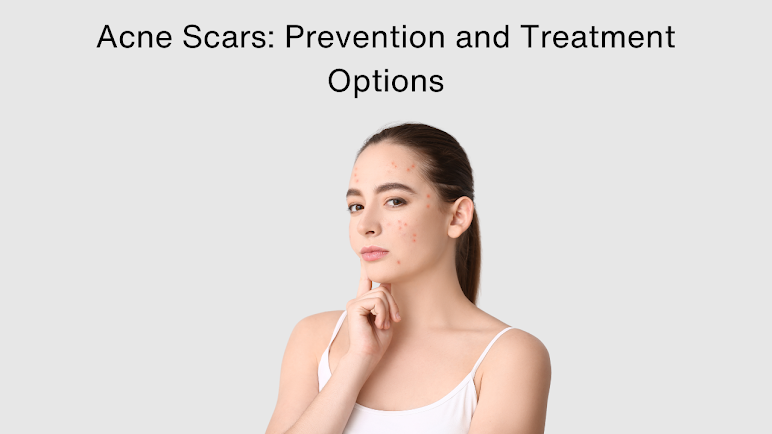Acne Scars: Prevention and Treatment Options

Welcome to the Gleuhr skin and dental clinic in Chandigarh and we provide best skin, hair and dental treatment in tricity and we also sell natural skin and hair products in all over world. We have best skin specialist in Chandigarh who are highly educated and dedicated to their work. https://clinic.gleuhr.com/

Hey there, skincare enthusiasts! Welcome back to our channel. Today, we're diving deep into a topic that affects many of us at some point in our lives: acne. Whether you're a teenager going through puberty or an adult dealing with unexpected breakouts, understanding the types and causes of acne is crucial for effective skincare. So, let's get into it!

Acne is a common skin condition that occurs when hair follicles become clogged with oil and dead skin cells. It often presents as pimples, whiteheads, blackheads, and in more severe cases, cysts or nodules. The most common areas affected by acne are the face, neck, chest, shoulders, and back, as these areas have a higher concentration of oil glands.
Acne isn't a one-size-fits-all condition; it comes in various forms. The most common types include:
Whiteheads and Blackheads
(Comedones): These are non-inflammatory acne lesions. Whiteheads occur when
hair follicles become clogged with oil and dead skin cells, while blackheads
are open comedones that darken due to exposure to air.
Papules and Pustules: These are
inflammatory lesions characterized by redness and swelling. Papules are small,
raised bumps, while pustules contain pus at their tips, giving them a white or
yellow appearance.
Nodules and Cysts: These are
severe forms of acne that extend deeper into the skin. Nodules are large, painful
bumps, while cysts are pus-filled, often causing pain and leaving scars.
Understanding the specific type of acne you're dealing with is the first step toward targeted treatment.
Now that we've covered the types, let's explore the root causes of acne:
Excess Oil Production:
Sebaceous glands in the skin produce sebum (oil) to keep the skin moisturized.
However, an overproduction of sebum can lead to clogged pores and acne.
Hormonal changes, often experienced during puberty, pregnancy, or menstruation,
can trigger increased sebum production.
Clogged Hair Follicles: When
dead skin cells accumulate and mix with excess oil, they form a plug in the
hair follicles. This creates an environment conducive to the growth of
acne-causing bacteria.
Bacteria (Propionibacterium
acnes): Everyone has bacteria on their skin, but an overgrowth of
Propionibacterium acnes can contribute to acne development. These bacteria
thrive in the clogged follicles, leading to inflammation and the formation of
pimples.
Inflammation: Inflammatory
responses play a significant role in acne. When the body detects the presence
of bacteria in clogged pores, it sends white blood cells to the area, resulting
in redness and swelling.
Hormonal Factors: Hormones,
especially androgens like testosterone, play a crucial role in acne
development. Androgens stimulate the sebaceous glands, leading to increased oil
production. This is why teenagers, pregnant individuals, and those with
hormonal imbalances are more prone to acne.
Dietary Influences: While the
link between diet and acne is still a topic of research, some studies suggest
that certain foods, such as high-glycemic-index carbohydrates and dairy
products, may contribute to acne development in some individuals.
Now that we understand the types and causes, let's talk prevention and treatment strategies:
Skincare Routine: Establishing
a consistent skincare routine is crucial. Use a gentle cleanser to remove
excess oil and debris, and consider incorporating products with ingredients
like salicylic acid or benzoyl peroxide to target acne.
Hormonal Management: For
individuals with hormonal acne, hormonal therapies such as birth control pills
or anti-androgen medications may be recommended. Consult a healthcare
professional for personalized advice.
Topical Treatments: Over-the-counter or prescription topical
treatments containing retinoids can help unclog pores and promote skin renewal.
These should be used under the guidance of a dermatologist.
Antibiotics: In cases of
moderate to severe acne, oral or topical antibiotics may be prescribed to
reduce inflammation and control bacterial growth.
Isotretinoin (Accutane): For
severe nodular or cystic acne, isotretinoin may be prescribed. It's a powerful
medication with potential side effects, so it's essential to discuss the risks
and benefits with a dermatologist.
Lifestyle Changes: Adopting a
healthy lifestyle can complement acne treatment. Stay hydrated, eat a balanced
diet, and manage stress levels, as stress can exacerbate acne.
In conclusion, acne is a complex skin condition with various types and causes. Understanding the underlying factors that contribute to acne is key to developing an effective treatment plan. Whether you're dealing with occasional breakouts or persistent acne, consulting with a dermatologist can provide personalized guidance for your skincare journey. Remember, everyone's skin is unique, so what works for one person may not work for another. Let's continue the conversation in the comments, and don't forget to like and subscribe for more skincare insights. Until next time, take care of your skin and stay fabulous!
Comments
Post a Comment